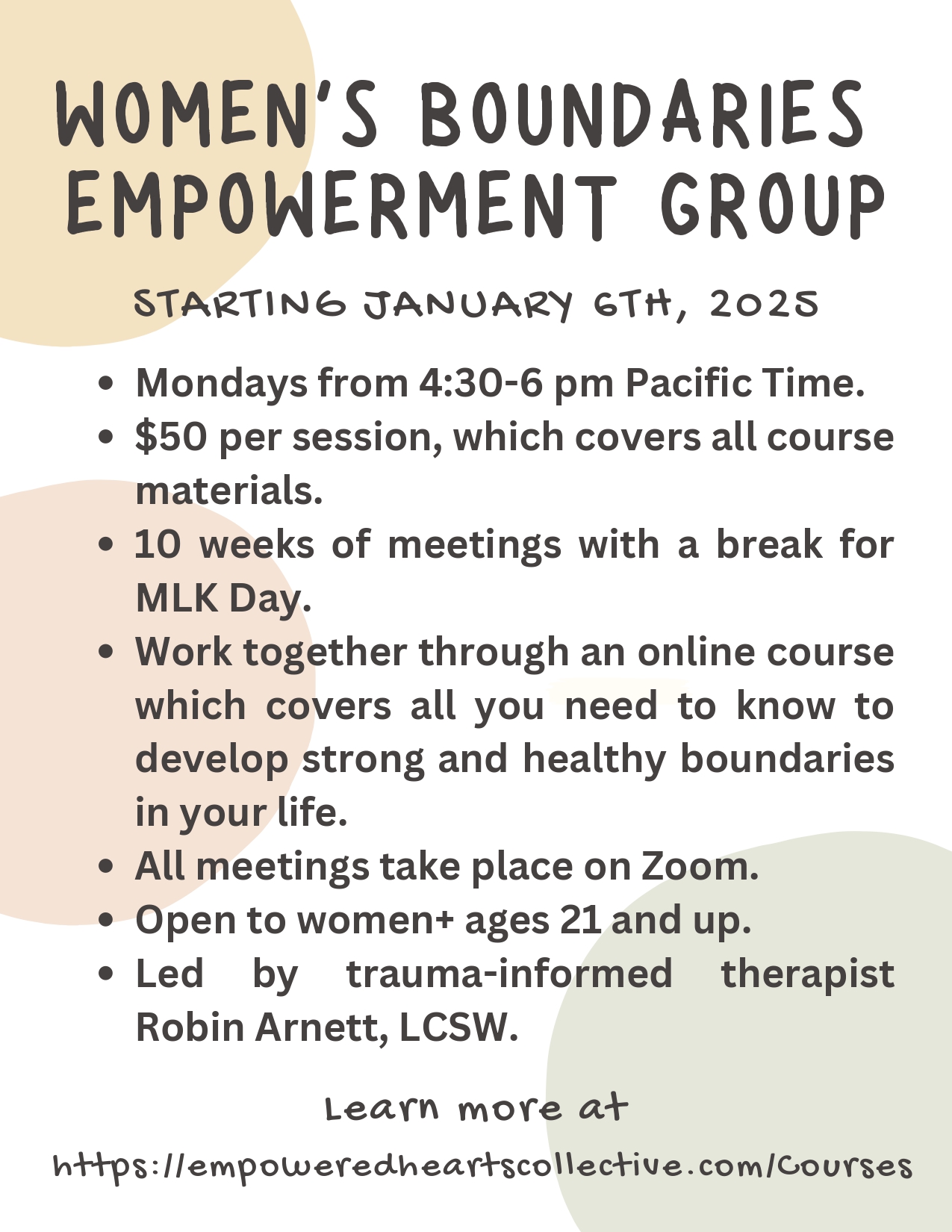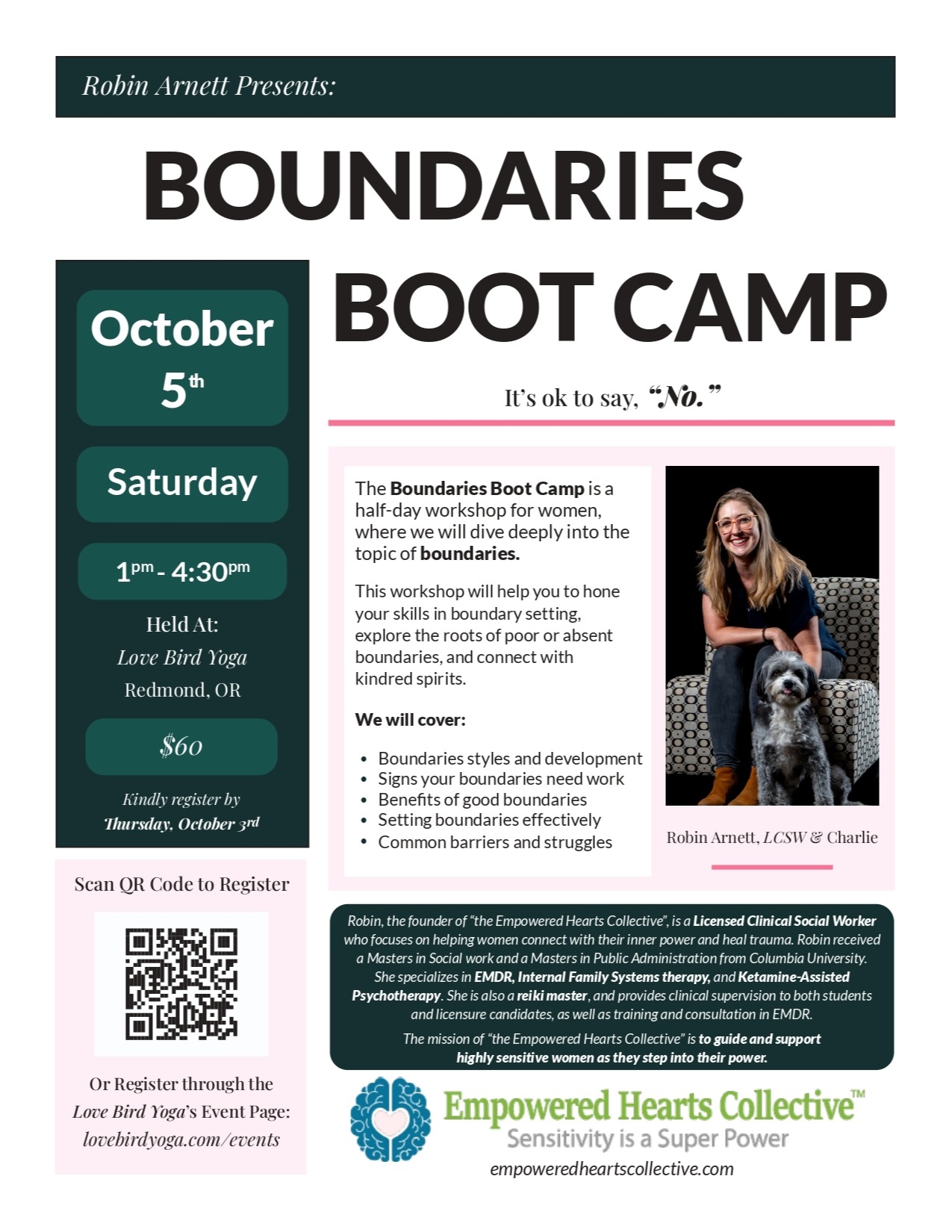Take the first step to stronger boundaries—unlock your free course, Module 7: Setting Effective Boundaries, from the Intuitive Boundaries Mastery Series.
Unlock Free ModuleThree Key Mantras for Healthy Boundaries in Relationships
Your Go-To Rules for Balance and Peace
By Robin Arnett
Our relationships are one of the most important parts of our lives, maybe the very most important. When they’re good, they can provide the connection, intimacy, fun, and nourishment that makes life a beautiful thing. Unfortunately, as vital as our relationships are, they can also be our biggest source of stress, pain, and even trauma.
Managing relationships comes up in almost every meeting I have with a client. We talk about what to put into relationships and when to step back, how to handle conflict and misalignments, and when a relationship needs to end.
So much confusion, self-doubt and uncertainty show up when we face struggles in our relationships. Deciding what to do can feel complicated, but it doesn’t have to be that way.
In my work, and in my own life, I’ve discovered a few key rules that can light your way. They apply across the board, from friendships, to partnerships, relationships with family, and professional relationships, and can become mantras that you refer to again and again. Let these rules be your guide in how you show up with the people in your life. Simplify, tune in, and value yourself. The rest will play out as it should.
-
My needs are both important and valid. I have a right to be heard.
So much time and energy gets wasted in trying to make ourselves something that we’re not, and make our needs different from what they are. The thing is, your needs might not line up with every person you meet. In fact, they probably won’t. Contorting ourselves to align with the needs of someone that we just aren’t a match for is both painful and doomed.
The best way to ensure the longevity and success of any relationship is the ability to be completely yourself.
You may have seen a good match play out in your friendships, in a partnership, with family or even in a job that’s been a great fit. It's important to remember those experiences. We need to be allowed to have the needs that we have, to speak them, and be heard, especially by ourselves. When this doesn’t happen, we inevitably feel that something isn’t right, even if we try to silence that voice. We either push down a part of ourselves, or the relationship eventually ends or gets distant.
People will often try to discount your feelings by saying that others would not care about the thing that matters to you. They may compare you to someone specific or name "other" mystery people that apparently set the standard. Remember that your needs matter in your relationships because they are yours. They are worthy of being heard and considered based on that alone. Nobody else gets to decide what should matter to you.
Something else to consider is that you, like everyone, have limits. It's important to respect your own limits when it comes to patience, energy, emotional labor, and stimulation. Constantly ignoring those limits because you "should" feel or be a certain way is a set up for disappointment, exhaustion, and conflict. Remember you are human too.
Instead of seeing your feelings and temperment as a barrier, embrace the person that is uniquely you. What you bring to the table is inherently valuable, even if it’s not a fit for everyone. You may not have the same kinds of friendships that your sibling or partner has, for example. One of you is not right or wrong; you are each uniquely yourselves. Lean in to what makes you who you are. Your needs are a part of that, but so is what you have to offer. They’re all part of the same wonderful package.
-
I will only do 50% of the emotional labor in all of my relationships.
Sometimes we want so much to turn the people in our lives into what we want them to be that we end up taking over completely. When we’re doing more than our share of the emotional labor in our relationships, we tend to grasp, control, and bring anxious energy to our connections. Letting go and stepping back may reveal realities that we don’t want to see, but those realities will be there whether we deny them or not. Doing more than our share can also cause resentment to build, and may lead us to disconnect or blow up. It’s important to be honest about what’s really going on; it will show up in a rupture, a shut down, or misdirected time and energy, at the very least. In the end, you respect the others in your life by letting them be exactly who they are. Controlling the relationship does not make room for that respect.
By that same token, if you feel like you’re putting in less than your share to a relationship, it’s a sign that you either need to step it up, or step out of the relationship completely. Showing up with less than 50% might mean that you’re in the relationship for comfort, convenience, or perceived safety, which isn’t fair to the other person or people involved. It may also mean that you can’t or aren’t ready to meet that person’s needs in the relationship, but don’t want to face that reality. Denying this truth is unfair to the other, and prevents you from growing.
Checking in with yourself on the norm that’s been set for emotional labor in your relationships can help you to examine assumptions that may have been there for years. This can be especially true in relationships with family, and you’re likely to experience pushback when you set a new tone. Remember that healthy boundaries are good for everyone involved, even if the people experiencing those boundaries don’t see it that way at first. Showing up as the healthiest version of yourself is the best way to ensure healthy connections, and emotional labor is an important piece of that equation.
-
I am not responsible for expressing other peoples’ needs for them.
Point #1 applies not only to you and your needs, but to everyone around you too. It’s crucial to be open to hearing feedback from the people in our lives. Feedback can be uncomfortable, but the rewards of curious and open listening are invaluable.
On the flip side, it also isn’t your job to make the people in your life share their feelings and needs. Attempting to read minds and guessing at what someone is feeling goes back to emotional labor, as well as vulnerability. Sharing our needs is a vulnerable act, and is an investment in the relationship. If you’re showing up with more of this vulnerability than your share, it’s probably time to step back yourself. If you find yourself being afraid that you’ve offended someone, that they don’t like you, or wondering if they need something from you, it’s easy to start to spiral. Of course, you can always reach out and ask how someone is feeling, but there’s a limit to how much of that can be yours. And once you’ve asked, the ball is in their court.
When others do express their feelings, it also isn't your job to fix those feelings for them. We can get hooked into thinking we've done something wrong when someone shares sadness, embarrassment, etc. related to any feedback that we've given, but that's theirs to hold and process.
Even if we do attempt to take those feelings on ourselves, we simply delay the inevitable - each person is responsible for processing and managing their own feelings. Nobody else can do it for them. When we try, we steal an opportunity for that person to learn and grow. In the same vein, it's our job to manage our own discomfort.
Go Forward with Confidence
I hope these go-to rules have given you a structure to gain some empowerment and clarity. If any of your relationships don’t allow you to live out these mantras, then it’s time to explore if a change needs to be made. Remember that stepping back is always an option, and can be a healthy and empowered choice. Making that choice can be painful, but the space and energy that frees up when you choose health and honesty opens you up in a completely new way.
Get excited for what can come into your life when you welcome it in by claiming your right to better. It’s all there for you.


